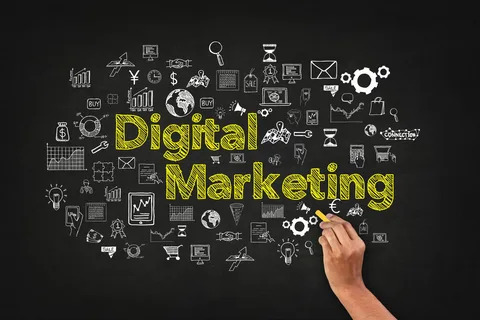In today’s digital-centric world, businesses are increasingly turning to digital marketing services to stay competitive and reach their target audience effectively. From startups to multinational corporations, leveraging digital marketing has become imperative for growth and success. This comprehensive guide explores the realm of digital marketing services, their types, benefits, implementation strategies, and future trends.
Introduction to Digital Marketing Services
Digital marketing services encompass a range of online strategies and tactics aimed at promoting businesses, products, or services through digital channels. These services leverage the power of the internet to connect with potential customers, build brand awareness, and drive sales. In an era where consumers are constantly connected to their devices, digital marketing offers unparalleled opportunities for businesses to engage and convert their audience.
Types of Digital Marketing Services
- Search Engine Optimization (SEO)
- Enhances website visibility on search engine results pages (SERPs) through organic tactics like keyword optimization, content creation, and backlink building.
- Pay-Per-Click (PPC) Advertising
- Allows businesses to bid on keywords and display ads prominently on search engines or other platforms, paying only when users click on their ads.
- Social Media Marketing (SMM)
- Engages target audience on social media platforms like Facebook, Instagram, Twitter, and LinkedIn through organic posts, paid advertisements, and influencer collaborations.
- Content Marketing
- Focuses on creating and distributing valuable, relevant content to attract and retain a clearly defined audience, ultimately driving profitable customer action.
- Email Marketing
- Utilizes email campaigns to nurture leads, communicate with customers, and promote products or services through personalized messages and offers.
- Influencer Marketing
- Partners with influential individuals or celebrities to endorse products or services, leveraging their authority and reach to expand brand awareness and credibility.
Benefits of Digital Marketing Services
Digital marketing services offer numerous advantages for businesses looking to establish a strong online presence and drive growth:
- Increased online visibility: By optimizing digital assets and leveraging various channels, businesses can improve their visibility and reach a larger audience.
- Targeted audience reach: Digital marketing allows for precise targeting based on demographics, interests, and behaviors, ensuring messages resonate with the right audience segments.
- Cost-effectiveness: Compared to traditional advertising methods, digital marketing offers a higher return on investment (ROI) by allowing businesses to reach more people with less expenditure.
- Measurable results: Digital marketing campaigns can be tracked and analyzed in real-time, providing valuable insights into campaign performance and facilitating data-driven decision-making.
How to Choose the Right Digital Marketing Services Provider
Selecting the right digital marketing services provider is crucial for achieving desired outcomes. Here are some key factors to consider:
- Understanding business goals: Choose a provider that takes the time to understand your business objectives, target audience, and unique selling propositions.
- Assessing provider expertise and experience: Look for a provider with a proven track record of success in your industry, with expertise in relevant digital marketing strategies.
- Evaluating case studies and testimonials: Review past client projects, case studies, and client testimonials to gauge the provider’s capabilities and client satisfaction levels.
read our new blog on social bookmarking sites
Digital Marketing Strategy Development
Developing a comprehensive digital marketing strategy involves several crucial steps:
- Market research and analysis: Understand industry trends, competitive landscape, and audience preferences to inform strategy development.
- Goal setting and KPIs: Define clear, measurable objectives and key performance indicators (KPIs) to track progress and success.
- Channel selection and budget allocation: Identify the most effective digital channels to reach target audience segments and allocate budget accordingly.
- Content planning and creation: Develop engaging, relevant content tailored to each digital channel and audience segment to drive engagement and conversions.
Implementing Digital Marketing Campaigns
Once the strategy is in place, it’s time to execute digital marketing campaigns across various channels:
- Executing SEO strategies: Optimize website content, meta tags, and technical aspects to improve search engine rankings and drive organic traffic.
- Launching PPC campaigns: Set up targeted ad campaigns on platforms like Google Ads or Bing Ads to drive immediate traffic and conversions.
- Engaging with social media audience: Create and share compelling content, interact with followers, and run paid advertising campaigns to increase brand visibility and engagement.
- Distributing content effectively: Share blog posts, videos, infographics, and other content across relevant channels to attract, inform, and engage target audiences.
- Sending targeted email campaigns: Segment email lists based on demographics, behavior, and preferences to deliver personalized messages and offers that resonate with recipients.
Monitoring and Analyzing Campaign Performance
Continuous monitoring and analysis are essential for optimizing campaign performance and maximizing ROI:
- Tracking key metrics: Monitor key performance indicators (KPIs) such as website traffic, conversion rates, click-through rates, and return on ad spend (ROAS) to assess campaign effectiveness.
- Analyzing data insights: Use analytics tools to gather actionable insights and identify areas for improvement, such as optimizing ad copy, refining audience targeting, or adjusting bidding strategies.
- Making data-driven optimizations: Implement changes based on data analysis findings to improve campaign performance, increase efficiency, and drive better results over time.
Future Trends in Digital Marketing Services
The digital marketing landscape continues to evolve rapidly, with emerging technologies and trends shaping the future of online marketing:
- Emerging technologies and platforms: Artificial intelligence (AI), augmented reality (AR), and voice search are revolutionizing digital marketing strategies. Offering new opportunities for personalization and engagement.
- Personalization and AI integration: AI-powered tools and algorithms enable hyper-personalized marketing experiences, from tailored product recommendations to dynamic content customization.
- Video marketing dominance: Video content is becoming increasingly popular and influential, with platforms like YouTube, TikTok, and Instagram Stories driving engagement and conversions.
Conclusion
In conclusion, digital marketing services play a pivotal role in helping businesses navigate the complexities of the digital landscape, reach their target audience effectively, and achieve their marketing objectives. By leveraging the right mix of strategies, channels, and technologies, businesses can enhance their online visibility, engage with their audience, and drive measurable results.
FAQs
- What are the main components of a digital marketing strategy?
A digital marketing strategy typically includes elements such as market research, goal setting, audience segmentation, channel selection, content creation, and performance measurement. - How long does it take to see results from digital marketing efforts?
The timeframe for seeing results from digital marketing efforts can vary depending on factors such as the chosen strategies. Target audience, industry competition, and budget allocation. While some tactics like PPC advertising can yield results, others like SEO may take several months to show significant impact. - Can digital marketing services be tailored to specific industries?
Yes, digital marketing services can be customized to suit the unique needs and challenges of different industries. Providers often specialize in specific sectors and have expertise in implementing strategies that resonate with target audiences in those industries. - Is it necessary to hire a digital marketing agency, or can businesses handle it in-house?
The decision to hire a digital marketing agency or manage marketing efforts in-house depends on factors such as available resources. Expertise, budget, and scalability requirements. While some businesses may benefit from outsourcing to a specialized agency, others may prefer to build internal marketing capabilities. - What sets apart a successful digital marketing campaign from an unsuccessful one?
Successful digital marketing campaigns are typically characterized by clear objectives, targeted audience segmentation, compelling content. Effective channel selection, ongoing optimization, and measurable results. Conversely, unsuccessful campaigns may lack strategic direction, fail to resonate with the target audience, or overlook critical performance metrics.



